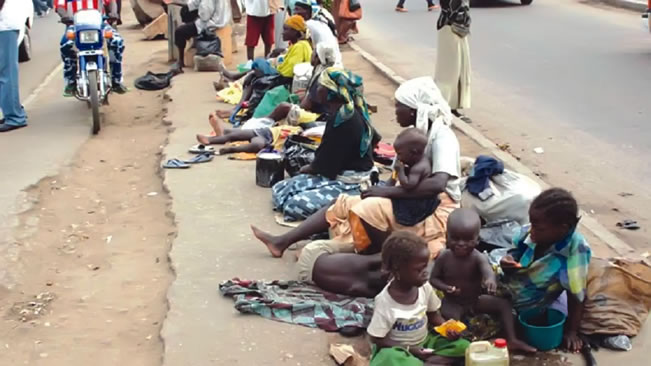Buhari preaches control as population may double in 2050
By Jeph Ajobaju, Chief Copy Editor
Muhammadu Buhari says he has just woken up to the warning that Nigeria’s 206 million population may double by 2050 and breed more poverty, the scourge of the North where families can have any number of children and dump them on the street.
Northern kids litter the South.
Especially Lagos. Here, they sleep rough after a day’s hardscrabble of begging or working the gig economy – hew wood, draw water, mend clothes and shoes, scavenge metal scraps from gutters, hawk farm produce, or serve as gatemen.
The reality everywhere in the world is that the greater the number of children a family has the greater its likelihood of falling below the poverty line.
But Northern Nigerians, the elite and the Talakawas alike, do not care a hoot.
Bad example set by Northern elite
Chief Justice of Nigeria (CJN) Ibrahim Muhammad (from Bauchi) is reported to have 32 children. House of Representatives Majority Leader Alhassan Doguwa (APC, Kano) announced on 25 January that he has just fathered his 28th child.
Doguwa, 56, introduced his four wives to the House plenary in January 2020 and announced at the time that he had 27 children. He now says he wants to have 32 before the election in February 2023.
Not all Northerners breed children beyond a reasonable number.
Aliko Dangote, the richest man in Africa, has four children – three biological daughters and one adopted son. Dangote has never married two wives at the same time, even though he is a Muslim like most Northerners.
Buhari himself has 10 children – some with Safinatu Yusuf, whom he married in 1971 and divorced in 1988; some with Aisha Halilu, his current wife whom he married in 1989.
Rich Northerners like Buhari may provide material care for their children, but even billionaires know that it is not possible to provide personal parental care for too many children.
Southerners try to limit the number of their children and struggle daily to provide them with good education and other necessities of life.
But the bad example shown by the Northern elite is followed by the poorest in the region, most of them peasant farmers indoctrinated by rabid Islamic preachers.
Mohammed Abubakar – known as Baba Masaba – a Muslim preacher from Niger State, had at least 86 wives and at least 203 children before he died in January 2017 aged 93, as reported by the BBC which quoted Daily Trust.
The only way anyone can maintain a large harem with a large number of children is to do mechanised farming – which most Northerners do not have the resources or desire to do – or steal public funds to support the unreasonable lifestyle.
Buhari’s platitudes
Buhari on Thursday in Abuja launched the Revised National Policy on Population for Sustainable Development, stressing the need for urgent measures to address high fertility rate through expanding access to modern contraceptive methods.
He also inaugurated the National Council on Population Management (NCPM), chaired by him, with Vice President Yemi Osinbajo as Deputy Chairman, and heads of relevant Ministries, Departments and Agencies (MDAs) as members.
He said the goal of the revised population policy is to improve the quality of life and standards of living of all Nigerians, which is one of the major aspirations of this administration.
_____________________________________________________________
Related articles:
House Leader, Ado Doguwa, welcomes 28th child, targets 30 before 2023 election
Lagos has lowest fertility rate, highest GDP; Katsina in reverse
Egg donation may cause infertility, experts warn
World population, now 7.8b, may decline after 50 years
__________________________________________________________________
Expanding access to family planning
”The policy emphasises the urgency to address Nigeria’s sustained high fertility rate, through expanding access to modern family planning, counselling and commodities as well as promote births spacing,” Buhari said.
”This will enable Nigeria to achieve rapid fertility control, improve the health of women, adolescents, new born and children, and other population groups.”
He noted that Nigeria’s population – the largest in Africa and seventh highest globally, and among the few whose fertility is still growing – hinges on a youthful population.
More than 72 per cent of the population is below 30 and half the female population is in the reproductive years of 15-49.
”These levels have implications for sustained population growth and narrowed prospects to achieving population management, facilitating sufficient demographic transition, harnessing our demographic endowment and eventually realising sustainable development.”
Buhari explained that the population policy underscores the importance of investing in quality education of young people (particularly girls), human capital development, advancing holistic effort to achieve significant demographic transition.
”The Revised Population Policy is rich with all necessary information that will guide the implementation of Nigeria’s Mid-term and Perspective Development Plan.
”It will further address concerns of the large population of young people who are our pride, our future and assets to drive our development efforts.”
He said implementation of the policy requires credible, reliable, timely, robust, geo-referenced and well disaggregated data, and expressed confidence that the forthcoming census will provide data for the implementation of the policy.
Planned parenthood ideals
National Population Commission (NPC) Chairman Nasir Kwarra urged Nigerians to embrace the noble ideals of planned parenthood and healthy reproductive behaviours enunciated in the policy.
The policy is the product of nationwide consultations with key stakeholders and interest groups drawn from federal and state ministries, civil society organisations, development partners, researchers, the media and the organised private sector.
“In addition to providing strategic direction in the implementation process, the [NCPM] will hopefully advocate for and support the conduct of the population and housing census, thus providing accurate and up-to-date data to guide the implementation of the Policy,” Kwarra said.
UNFPA contribution
United Nations Resident Coordinator in Nigeria, Matthias Schmale, in his goodwill message expressed confidence that the policy will succeed for several reasons.
His words: ”Firstly, the policy brings to the forefront the linkages between population and development and will inform work and services to improve the well-being and lives of Nigerians.
”Secondly, the policy is coming on the heels of the recently launched 2021-2025 National Development Plan which focuses on making Nigeria the greatest economy in Africa and even more of a force to reckon with in the world.
”Thirdly, the successful implementation of the National Policy will very likely have positive implications for maternal health development, youth and adolescent rights and the empowerment of women and the girl child.”
Schmale said the world and the UN look forward to a Nigeria with low maternal mortality, low teenage pregnancy and childbirth, reduced fertility rate, increased utilisation of modern contraceptive methods, and high education attainment, among others.
He pledged that United Nations Population Fund (UNFPA), which provides support for data compilation, will continue to work with the NPC to ensure that Nigeria’s coming census meets local and international standards and acceptability.














